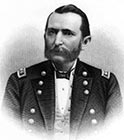Return of the Wounded Volunteers to Camp Douglas

Salt Lake City, Utah. February 9th, 1863.
Editors Alta:
My abruptly terminated letter of yesterday had, in the order of narrative, reached the transportation of the wounded from the battlefield to Camp Douglas. The weather, fortunately, had greatly moderated, and through still cold, the wounded were very comfortably provided for, and suffered nothing from exposure. Not a murmur was ever heard on their long journey, and every man seemed to be more solicitous for his comrade than himself, and every act of kindness and attention that the lesser wounded could show to those less fortunate was done with a readiness and cheerfulness that showed there was more of country than of men in the relationship between them. They were brothers-in-arms for a common cause.
Colonel Connor dispatched to Colonel Evans to make every preparation for the reception of the wounded, and gave the necessary instructions for the disposal of the dead. Dr. Reed sent in advance of his train of wounded, messengers every day to make preparations in the settlements for their arrival, and Colonel Evans had rations served, and tea, coffee, and soups, cooked, awaiting them on being carried to the hospital, the theatre, and the chapel tent, which had been fitted up with everything that would conduce to the convenience and comfort of the wounded. The stillness of the midnight hour, when they arrived, and the flag drooping at half-mast, lent a solemnity to the scene not soon to be eradicated from our memories. There was a sadness about the camp that was felt by every person, and only rendered supportable by the knowledge of the bravery of our men, the complete success of the expedition and the exterminations of the murderous savages.
The Arrival of the Command
Detained by the snows in the mountains, the command only returned on the evening of the 4th, cold and weary. A drove of about a hundred head of Indian horses entering the camp was the first announcement of the returning of the men. Then rode up the Colonel in a buggy,
with the renowned Portor Rockwell, of great Mormon notoriety, who had been his guide and soon after appeared Major McGarry at the head of the cavalry, and the infantry following, mounted on the Indian ponies they had captured. The command was soon in quarters, and the sick and crippled received the attentions which their condition demanded. In the assistance off Dr. Reed, the names or Dr. Williamson, of the command, and Dr. Walcott Steel, of Dayton, Nevada, deserve mention. Both gentlemen went out about fifty miles to meet the wounded, and have since been close in their attentions to them.

That the Indians in Washington Territory and to the north of us, have been effectually checked in their murdering career, it is with some a matter exceedingly doubtful. Those who know them best, and on whose judgment I would place confidence, think that the Indians will never again attempt a fair stand-up fight. Possibly, after the winter has broken up, another expedition will set out after Pocatello and other chiefs who have large bands with them. I incline to the belief that Colonel Conner will clear the northern route to California of Indians this coming summer. If he is not ordered East, he will doubtless attempt to conciliate his men to their disappointment by engaging them in active service on the north and central routes. There need be no apprehension of these routes henceforth being left to the mercy of the savages, for whether the present will be maintained.1
Special Correspondent for The Daily Alta California.
Notes…
- MXXXXX, published by the Smithfield Sentinel, Friday, May 12, 1922.